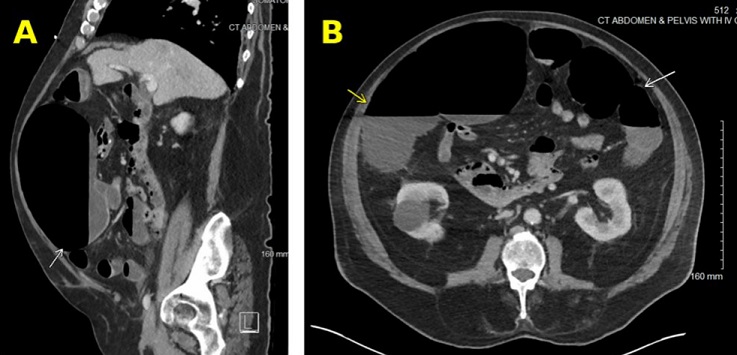Nikhil Prasad Fact checked by:Thailand Medical News Team Oct 12, 2024 1 year, 4 months, 1 day, 2 hours, 12 minutes ago
Medical News: Since the COVID-19 pandemic began in 2020, it has been well-documented for its impact on respiratory health, leading to symptoms such as cough, shortness of breath, and in severe cases, pneumonia and acute respiratory distress syndrome. However, medical researchers have increasingly recognized that COVID-19 does not limit its assault to the lungs alone. It has shown the ability to affect multiple systems in the body, causing a wide variety of symptoms.
 Sagittal view of CT abdomen and pelvis showing cecal dilation (white arrow); (B) Axial view of CT abdomen and pelvis showing cecal dilation (yellow arrow) and fluid levels in the distal colon (white arrow)
Sagittal view of CT abdomen and pelvis showing cecal dilation (white arrow); (B) Axial view of CT abdomen and pelvis showing cecal dilation (yellow arrow) and fluid levels in the distal colon (white arrow)
This
Medical News report highlights the case of an 82-year-old man, who contracted COVID-19 and presented not with respiratory symptoms, but gastrointestinal issues, specifically colonic ileus. This complication showcases the virus's potential to affect the digestive system, offering new insight into the wide range of symptoms COVID-19 patients might experience. The case study was carried out by researchers from the Lake Erie College of Osteopathic Medicine and Conemaugh Memorial Medical Center in the United States.
Colonic Ileus: A Rare Gastrointestinal Manifestation
COVID-19's primary target is the respiratory system, but gastrointestinal manifestations have also been reported. In a significant number of cases, patients exhibit symptoms such as diarrhea, nausea, vomiting, and abdominal pain. In this particular case, the patient experienced a more severe complication in the form of colonic ileus.
Colonic ileus occurs when the large intestine (colon) is unable to move waste material normally, leading to a buildup of gas and fluids, which results in painful distension of the abdomen. The exact mechanism behind COVID-19-related ileus remains unclear, though several theories have been proposed. One key hypothesis is that the virus invades the gastrointestinal system by binding to angiotensin-converting enzyme 2 (ACE-2) receptors, which are found in both the lungs and the intestinal tract.
Case Presentation: An Elderly Man with Non-Respiratory Symptoms
The 82-year-old male patient arrived at the emergency department after feeling weak for two days. Upon admission, he was diagnosed with rhabdomyolysis, a condition where muscle breakdown releases harmful proteins into the bloodstream, potentially leading to kidney damage. His blood pressure was alarmingly low, and laboratory tests showed abnormal kidney function. Despite testing positive for COVID-19, the patient had no respiratory symptoms, such as cough or difficulty breathing.
Soon after, the patient’s abdomen began to swell, and he developed nausea and vomiting. A series of diagnostic tests, including an X-ray and a CT scan, revealed that his cecum - a part of the large intestine - was significantly dilated, indicating colonic ileus. The patient’s abdomen was firm, and bowel sounds were minimal, suggesting that waste movement through the intestines had halted.
Treatment and Hospital Course
/>
Once the colonic ileus was identified, the patient was treated with intravenous neostigmine, a medication designed to stimulate bowel movements. This provided some relief, as the patient was able to have bowel movements after the treatment. However, his abdomen remained distended, and he continued to feel discomfort.
A nasogastric tube was inserted to help relieve the pressure by draining stomach contents, but the patient removed the tube after feeling uncomfortable. Further examination revealed severe inflammation in his colon, particularly in the ascending colon, which was caused by ischemia (a lack of blood flow to the area). Despite several interventions, including enemas and a colonoscopy to decompress the colon, the patient’s condition showed minimal improvement.
Eventually, repeat imaging indicated that the distension had worsened, and surgical consultation was recommended. The patient’s family requested that he be transferred to another facility for further care, as his condition remained unchanged.
Understanding the Role of ACE-2 Receptors and Cytokine Storms
Researchers believe that ACE-2 receptors in the gastrointestinal tract may play a pivotal role in cases of COVID-19-related colonic ileus. These receptors are normally involved in maintaining a healthy balance of amino acids and regulating gut microbiota. However, the SARS-CoV-2 virus can disrupt these functions, leading to gut dysbiosis - a microbial imbalance that can contribute to inflammation.
Additionally, the patient may have been affected by a cytokine storm, which is an overactive immune response triggered by the virus. In this scenario, the body releases too many pro-inflammatory cytokines, leading to widespread tissue damage and organ failure. This immune system dysregulation could have further exacerbated the patient’s gastrointestinal symptoms, contributing to the severity of his colonic ileus.
Conclusion: Implications for COVID-19 Management
This case study highlights the importance of recognizing extrapulmonary manifestations of COVID-19, particularly in elderly patients who may not display the typical respiratory symptoms. Colonic ileus, while rare, is a serious condition that requires immediate medical attention. The delay in diagnosing gastrointestinal complications could result in severe consequences, such as bowel perforation or ischemia.
Healthcare providers should remain vigilant for non-respiratory symptoms in COVID-19 patients, especially those with pre-existing conditions that may complicate their treatment. Early diagnosis and intervention are key to managing such cases effectively. The pathophysiology of COVID-19-associated ileus involves complex interactions between viral invasion, immune responses, and gut health, underscoring the need for further research into targeted therapies.
The study findings were published in the peer-reviewed journal: Cureus.
https://www.cureus.com/articles/288764-exploring-covid-19-associated-ileus-a-compelling-case-study#!/
For the latest COVID-19 News, keep on logging to Thailand Medical News.
Read Also:
https://www.thailandmedical.news/news/breaking-covid-19-news-case-study-shows-that-even-asymptomatic-sars-cov-2-infections-can-lead-to-spontaneous-bowel-perforations
https://www.thailandmedical.news/news/case-reports-documenting-covid-19-patients-developing-mesenteric-panniculitis-and-acute-abdominal-pain-as-infection-progresses
https://www.thailandmedical.news/news/new-disease-linked-to-long-covid-introducing-sars-cov-2-persistent-intestinal-epithelial-syndrome-spies
